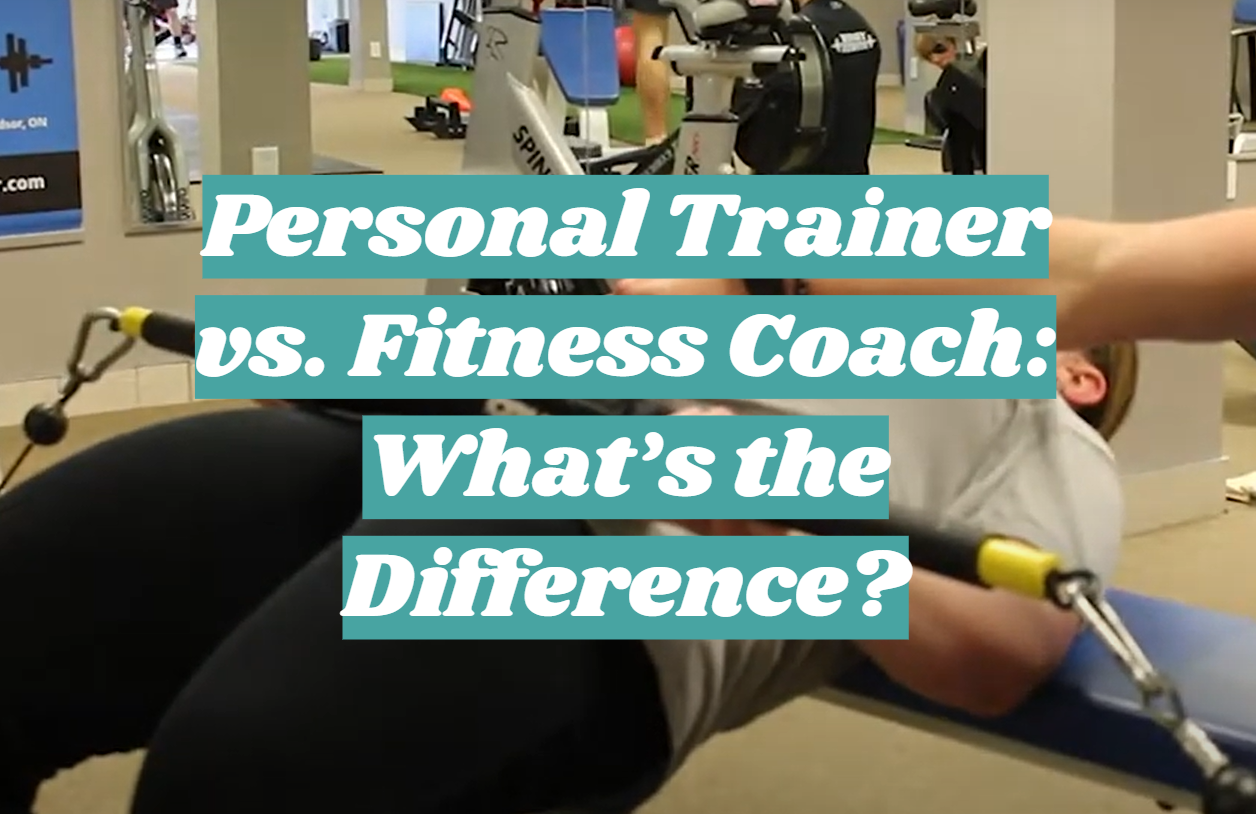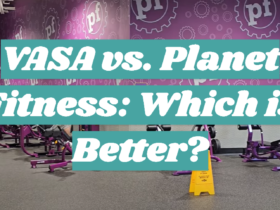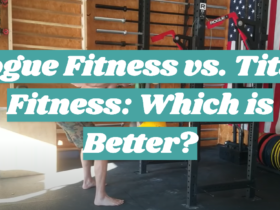When it comes to getting fit, there are a lot of options available to you. There are many ways to get fit, including joining a gym, working with a personal trainer, or following a fitness training program. What separates these two options? And which one is right for you? In this article, we will answer those questions and more. We understand that it can be difficult to decide whether you need a personal trainer or fitness coach. Here, we will help explain the key differences between the two, so that you can make a more informed decision about which one is right for you.
What is a personal trainer?
If you have specific fitness goals, working with a personal trainer is the best way to achieve them. They will create a custom workout plan for you, based on your unique needs and goals.
They will provide motivation and support to help you stay on track. They work one-on-one with clients to create customized workout programs and provide motivation and support every step of the way. Personal trainers must have a bachelor’s degree at minimum in exercise science or related field, and be certified by a national organization such as (NSCA) or (ACSM). [1]
What is a fitness coach?
A fitness trainer is a coach who helps people achieve their desired level of physical fitness. They work with individuals or groups, and tailor programmes to each person’s needs and abilities.
Fitness coaches work with clients of all levels, from beginner to advanced. They create workout programs, offer accountability and support, and help clients learn about nutrition and other lifestyle factors that impact their health.

Fitness coaches typically have a background in exercise science or a related field.[2]
Similarities Between Fitness Coaches and Personal Trainers
Fitness coaches and personal trainers help people by targeting problem areas and formulating a plan to improve overall fitness. They help people to get in shape by creating workout plans, providing instruction and support, and keeping them motivated.
Fitness coaches and personal trainers share many likenesses, though there are some crucial distinctions between the two.
Focus on Fitness
The common goal of a fitness coach and personal trainer is to help their clients improve physical health. They work with people from all ages, sizes or levels in terms on how they can achieve the best possible outcomes for themselves through exercises that will improve cardiovascular wellness as well as muscular strength and flexibility. Fitness trainers are an integral part of the fitness industry, often working with gyms and other organizations. They can lead group classes as well as one on ones for clients who want personalized training programs tailored just to them!
Personal trainers are the best at getting to know their clients, understanding what they need and want from a workout plan. They offer one on ones so that personalized attention can be given as well as customized workouts for an individual’s unique fitness goals. Having a personal trainer is like having an accountability partner that’s there for you at every step of your fitness journey. Since they are so closely involved in all aspects from beginning to end, it’s easy to keep yourself motivated and on track with what needs to be done next.
Knowledge of Exercise Science
The primary distinction between a personal trainer and fitness trainer lies in the former’s comprehensive understanding of exercise science. A personal trainer’s in-depth understanding of how our muscles work during exercise, movement principles, and the ways different muscles interact sets them apart from the average fitness enthusiast. This allows them to create workout programs that are specifically tailored to their clients’ needs and goals, while also being safe and effective. Fitness trainers, on the other hand, tend to have a more general understanding of exercise and may not be as well-versed in the science behind it. While they may be able to create basic workout programs, they are not as equipped to tailor programs to individual needs or adapt them as needed. This can increase the risk of injury and reduce the effectiveness of the workouts.
Location of Work
Personal trainers are not limited to working in gyms; they can also work in fitness centers or other health clubs. They may also travel to clients’ homes or workplaces. In contrast, fitness trainers are often employed by businesses or organizations to design and oversee corporate wellness programs. Some may also work in hospitals, physical therapy clinics, or nursing homes.

The main job duty of a personal trainer is to design and carry out workout regimens for their clients that are tailored to their individual needs and goals. A personal trainer not only must be able to assess their client’s progress, but also provide adequate encouragement for fitness goals. Fitness trainers typically design and lead group exercise classes, such as aerobics, yoga, or Pilates. They tailor their workouts to fit the needs of individuals, whether those people have special fitness goals or require extra attention. [3]
Differences Between Fitness Coaches and Personal Trainers
Fitness coaches and personal trainers have a lot in common, but one important difference is the education requirements for each profession. To become certified as both a Personal Trainer or Fitness Coach you must complete an accredited training program with passing scores on national exams after completion of this coursework/courses gap-there’s no formal school required to be able get started working at either side.
Fitness coaches and personal trainers aid clients in meeting physical fitness goals, but that is the only commonality between the two professions. Personal trainer is typically one-on-one while working towards reaching specific targets set out by you or me; whereas a coach might lead group classes in order to organize exercises for everyone involved – whether they want to or not.
Significantly, fitness coaches and personal trainers are almost always compensated differently. While some get paid by the hour, others may be compensated with a salary or an hourly rate depending on their experience level in training clients for various sports Gambles as well-being able to work out at all!
Although fitness coaches and personal trainers both help people improve their physical fitness, the two roles have some notable distinctions. A person can be a highly qualified coach or trainer if they have an accredited training program in which they complete on becoming one of these professionals- so consider checking out what’s available near where you live!
Scope of Practice
Fitness coaches and personal trainers share many of the same goals, but they each have their own unique scope. A fitness coach is someone that helps people with physical fitness; however a general term for this profession might be “fitness professional.” They work in gyms or studios as well as being self employed which makes them more versatile than those who specialize solely on one form like weight loss treatments at home etc. In contrast there’s only a limited amount you can do from behind when it comes to training clients individually – so if all these things are important then consider finding an experienced Personal Trainer instead.
Types of Certification
Although personal trainers and fitness coaches have different qualifications, they are similar in their approach to helping people get fit. Fitness coach degrees usually fall under exercise science or kinesiology, though not always. Some may also hold certifications from organizations like (NSCA) or (ACSM). Receiving certification from an organization such as NASM or American Council on Exercise will improve your chances of a Trainer providing you with good results.

A fitness trainer certification is not required to become a personal trainer, but there are many certifications available. The most common ones are:
- (CPT)
- (RET)
- (NETA)
To be certified, you will need to pass an exam and obtain continuing education credits. The requirements vary depending on the type of certification you desire. [4]
FAQ
What does a fitness coach do?
A fitness coach is a people-person who knows how to get results. They see the potential in others and help them achieve it through exercise, nutritionist or coaching services that target all abilities from children right up until older adults. The individual who helps you get in shape is a fitness coach. Whether they’re working with individuals or groups, this person’s goal will be to design workouts that are safe and effective so their client can stay on track towards reaching his/her own personal best.
Fitness coaches are often bred from a background in exercise science or related fields, and they have typically obtained certification by organizations such as (NSCA) or (ACSM).
Is a fitness coach worth it?
The quick answer is yes! A fitness coach can teach you how to properly use equipment, plan and execute safe and effective workouts, and give you the accountability and motivation you need to reach your fitness goals. While you could probably find all of this information on your own, it would likely take much longer-and be less fun.

Think of it this way: A fitness coach is like a personal chef for your health and fitness. They create a custom plan based on your unique goals, preferences, and abilities, then help you execute it in a way that’s enjoyable and sustainable.
What should you expect from a fitness coach?
Fitness trainers are an invaluable part of our society, helping people reach their desired level of fitness. They work with individuals and groups to improve overall health levels by teaching new exercises that can be done at home as well as encouraging a healthy lifestyle. Personal trainers are fitness experts who help their clients achieve specific goals. For example, some might work one-on-one with you and tailor programs just for your needs! A fitness coach is someone who helps you reach your goals. Whether it be weight loss or muscle building, they will work with clients on developing a workout routine and providing motivation for each session of exercise! Fitness coaches have degrees in Exercise Science and related fields so no matter what their client needs – there’s always something new coming up next month at our gym.
Do I need a personal trainer to lose weight?
While a personal trainer can give you an edge, it is not a requirement to lose weight. You can achieve your weight loss goals on your own by making healthy lifestyle choices and being mindful of your food intake. A personal trainer can provide you with the extra support to reach your goals that you might not be able to get on your own. A personal trainer can also tailor a workout plan specifically for you, based on your fitness level and goals.
What is the difference between a personal trainer and a fitness trainer? A personal trainer will coach you to reach Fitness level-specific goals that can be attained by working out and being physically active. A fitness instructor leads group classes on how best to maintain an active lifestyle while also providing information about staying healthy in mind for those who might not know what they should do regarding their health status.
What do you call a fitness trainer?
Fitness trainers come in all shapes and sizes! Fitness is an area that’s gaining more attention than ever before. Whether you want to lose weight, get fit for your next event or just have fun with fitness – we’ve got the right professional for you at Fitstepians. The most common type of fitness trainer is a personal one. They work with an individual client or small group to help them improve their physical condition by providing guidance and expertise on how best for you handle your exercises, dieting habits etc., so that together we can achieve what’s desired from our sessions.

What is a personal trainer? The best personal trainers are upbeat, friendly people that motivate their clients to work hard. They have a passion for helping others live healthier lives and they love seeing the difference it makes in someone else’s life when they take control of his/her fitness goals. What are the key differences between personal trainers and fitness coaches? Personal trainers typically work with one client at a time, whereas fitness instructors often work with several clients simultaneously. Both professions strive to help individuals achieve their weight-loss and fitness goals. Fitness trainers work in gyms or other fitness facilities, teaching group classes. Personal trainers can also be found working one-on-one with their clients and sometimes small groups of people who want to get fit together.
How long should I stay with a personal trainer?
After working out with a personal trainer for some time, you might feel confident enough to work out on your own. There is no set amount of time that you should stay with a personal trainer, but most people usually transition to working out independently after 2-3 months. Most people see results 3-6 months after starting to work with a personal trainer. Your results may improve if you workout more frequently, have a well-balanced diet, and are already physically fit.
How many times a week should you be a personal trainer?
The average personal trainer sees their clients two to five times per week. This schedule provides enough time for the trainer to see significant results from their client, without overworking them.
Fitness trainers, on the other hand, typically work with their clients only one to two times per week. A fitness trainer’s focus is on helping their client maintain current fitness levels, not on improving them.
How much does a fit coach cost?
The average cost for a Fitness Trainer is $50 per hour. This price can vary depending on the length of the session, the location, and the trainer’s experience. Personal trainers work with clients individually to help them achieve their fitness goals by providing customized instruction and support. Whereas, group exercise classes are run by a Fitness Trainer who has more of an emphasis on creating opportunities for people’s physical well being while also encouraging competition among those taking part in order make it easier competitive (and thus interesting). What is the difference between a fitness trainer and a personal trainer? The difference between a fitness trainer and personal trainer is primarily the focus of their work. Fitness trainers typically work with groups, while those who specialize in helping people have more specific goals will be considered “personal” training professionals. Personal trainers work with clients one-on one while fitness professionals may focus more heavily on helping people exercise. A personal trainer will typically have a client’s goals in mind, whereas the task of an average fitter is not only to keep them physically active but also mentally stimulating through different types of exercises such as running or indoor biking which can be done anywhere at any time without equipment needed.
Useful Video: Personal Trainer vs. Fitness/Health Coach
Conclusion
Personal trainers are professionals who help people reach their fitness goals by providing individualized instruction and support. A fitness trainer, on the other hand, is someone that teaches group classes or works with multiple clients at once – they’re not just one-on-one coaches like personal training sessions usually entail! Though there is some overlap between the two roles, they are distinct positions with different responsibilities. We hope this article has helped to make clear the primary distinctions between personal trainers and fitness coaches.
References:
- https://www.theptdc.com/articles/are-you-a-professional-fitness-coach-or-a-personal-trainer-whats-the-difference
- https://niewcertified.com/difference-between-a-personal-trainer-and-a-fitness-coach/
- https://online.maryville.edu/online-bachelors-degrees/exercise-science/careers/fitness-coach-vs-personal-trainer/
- https://embodyfitness.co.uk/fitness-coach-vs-personal-trainer/










Leave a Review